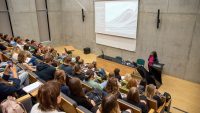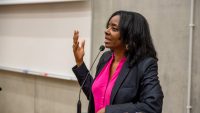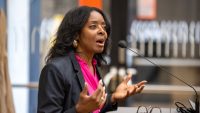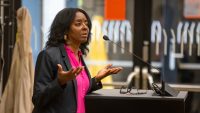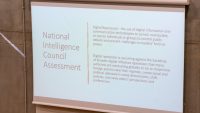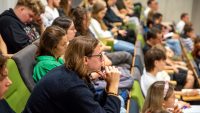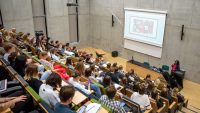Former CNN Executive Producer Jennifer Thomas visited VMU
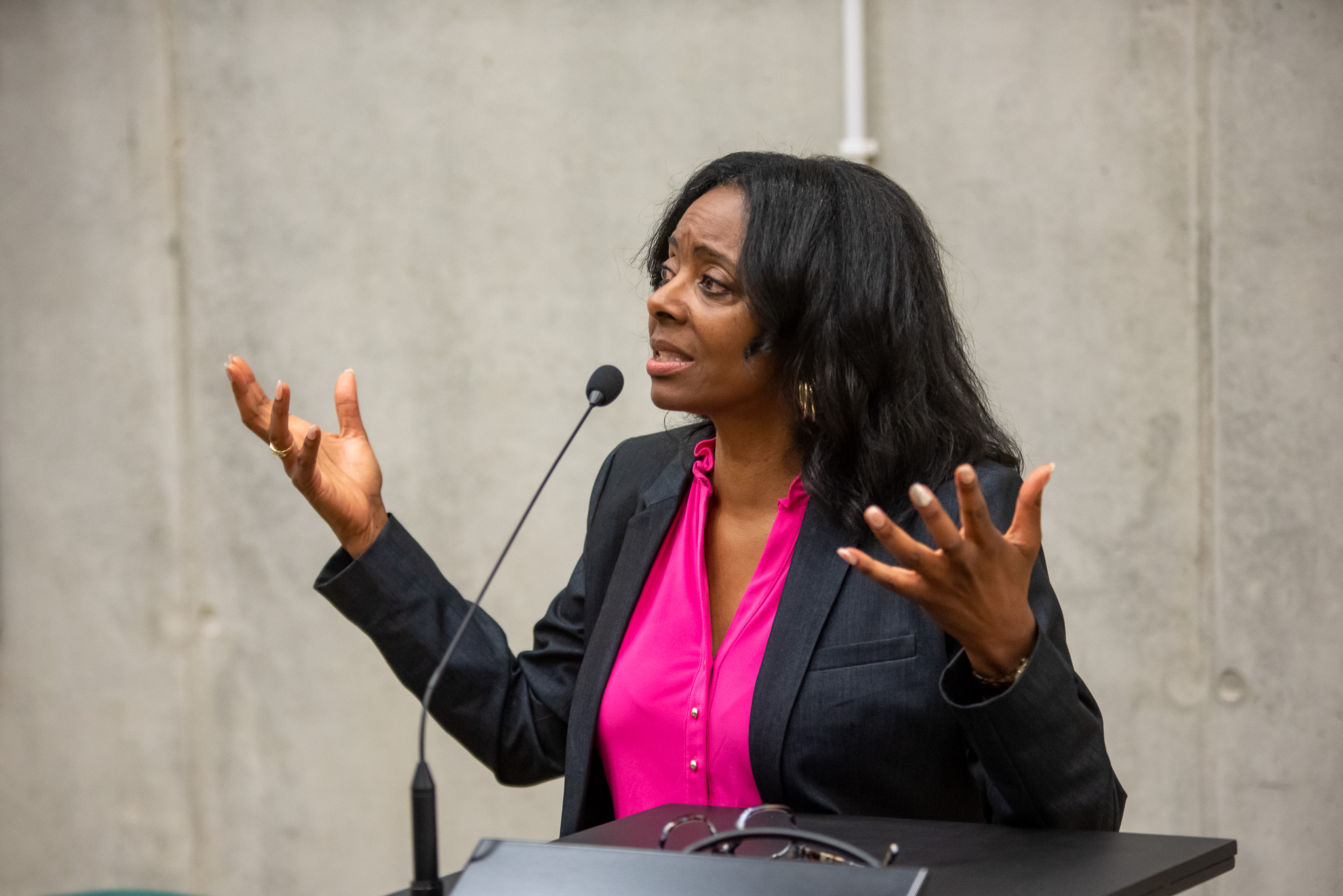
“Talk about facts first. If you watched my newscasts, you wouldn’t know who I supported because it’s about the story, not me. You have to try to show both sides – if there is another side to show. If it’s the war in Ukraine, most people know [that] Putin and Russia are spreading a lot of disinformation, so you can’t show that side if you know it’s based on lies”, says Associate Professor at Howard University (USA), former CNN executive producer and journalism expert Jennifer Thomas, who held a lecture at Vytautas Magnus University (VMU) on the importance of journalism in the era of disinformation.
Utilising her over 25 years of experience in journalism, Thomas discussed various challenges of the field, including, first of all, the public’s greatly diminished trust in the media and the rise of “fake news”. According to her, many people today do not see the work of journalists as fair and balanced.
“It makes me think, what are we doing wrong? I call it convergence-led confusion, different forms of media, traditional and internet. There is so much information that it leads to confusion about who to trust and what’s real. In the USA, it’s the confusion of news versus opinion. There is an abundance of opinion-based programming in the US. It’s popular and it sells. This takes away from important issues and becomes about the person reporting”, the associate professor notes, admitting that a lot has changed since she started working at CNN 20 years ago, and the change has not always been for the better.
Trump contributed to erosion of trust in the media
Discussing the rise of citizen journalism, Jennifer Thomas reminded the audience that it can be great, for instance, when the public found out about the murder of George Floyd thanks to a video by a 16-year-old and the protests erupted because of it. On the other hand, citizen journalism can be a platform for disinformation, when someone spreads false information, but others share it without verifying, which results in a domino effect. There are still no real ways to police the internet and manage the spread of false reports.
According to the guest, a significant role in the spread of disinformation and the decrease of trust in the media was played by the former U.S. president Donald Trump, who is currently facing four criminal cases, including for alleged efforts to overturn the election.
“Every chance he got, he attacked the press. What happens when the leader of the free world refers to everything we do as not real? [It] erodes trust in what we do. (…) It is dangerous for any head of state to attack the media. We uphold democracy, we are not an autocratic nation. What happens when you lose the press holding someone accountable?”, Jennifer Thomas asked rhetorically.
On the other hand, the former CNN producer emphasised that the relationship between the President of the USA and the media has never been “warm and fuzzy”.
“Even though many people loved Obama, he had overall a very icy relationship with the press. Most presidents do, because we’re there to ask those tough questions that put you in the hot seat. But there was never a disrespect for the press and saying something was fake and not real – until Donald Trump. The era of disinformation started during his election”, said the associate professor, noting that today the biggest perpetrators of disinformation on a global scale are Russia and China.
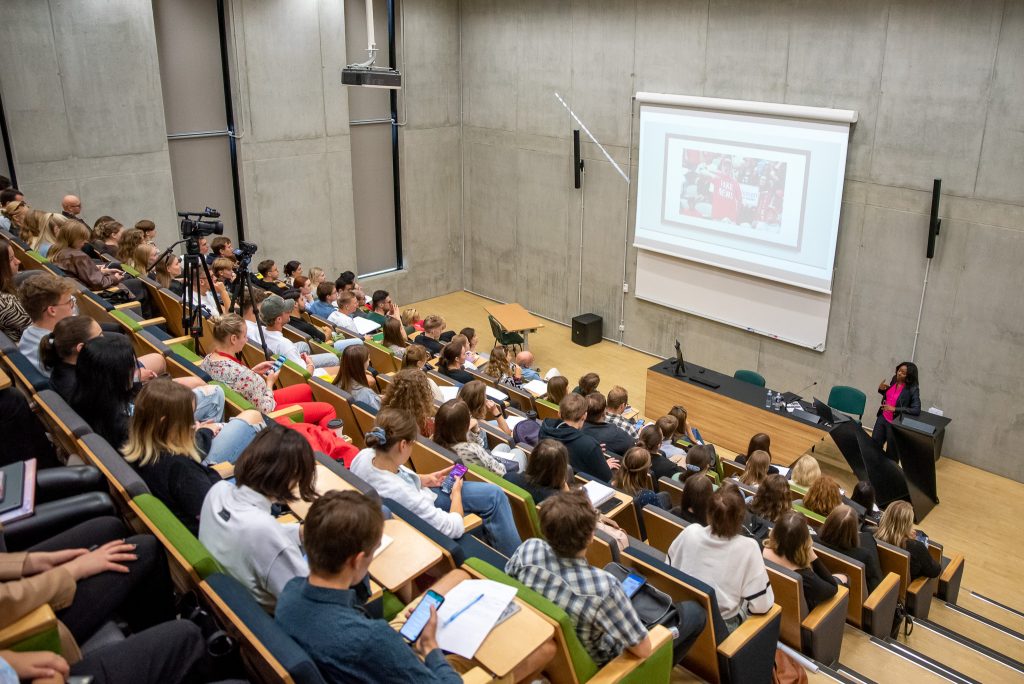
Verify information and be sceptical
The expert also shared some advice on how to sustain journalism in the era of disinformation: for instance, it is important to carefully verify information, learn to recognize “fake news”, make use of training opportunities, and join organisations that support the mission of journalists.
“Consider the source: look where the information is coming from. Look at the URL of the link, at the byline, the author, the About section. Be sceptical. It’s okay to question the information you see; often it will make you a smarter consumer”, Thomas said, sharing her tips with VMU students, future journalists.
“Lastly, focus on facts and issues that are facing your community. Journalists are savvy and sophisticated storytellers. All news is local: whatever the topic of news, there should be a local angle. I challenge you as journalists to cover stories that impact communities and tell how they affect the people, e.g. terrorism, coronavirus, racial inequality, unemployment, ethics, voter suppression, healthcare, economy etc. [When] you’re at a local press conference, you hear something, tell why it matters, how it affects a person’s day to day life”, Howard University’s scholar explained.
September 11 was a traumatic experience
Recalling her work at CNN, the guest said that she enjoyed the experience very much, as she had an opportunity to cover many memorable events including the Olympic games, presidential elections, and September 11th.
“On September 11th, I was the 9 a.m. show producer, so everything happened just as my show was going to air. It was very traumatic, I couldn’t even talk about 9/11 for ten years. Just with everything we saw, being in the control room, seeing everything happen in real time, deciding what to report. Another case where were times when information was coming in and we don’t know what’s true or not. Sometimes you have to sit back and fact-check”, she said, adding that CNN has a separate desk for checking the facts and sources of a story.
Jennifer Thomas became interested in producing because it is a responsible job that comes with a lot of power: a television producer makes decisions that affects the entire program, decides the order of the show, the stories that go on the show, who is reporting etc. At the same time, she emphasises that diversity is important – both in the positions of producers and in the media in general. Thomas remembers that she was the youngest and the only black producer when she started her first job after graduating college. Twenty years later, when she was promoted at CNN to executive producer, she was the first and only black female in that position for domestic news for all shows on CNN, which illustrates that situation has not improved much.
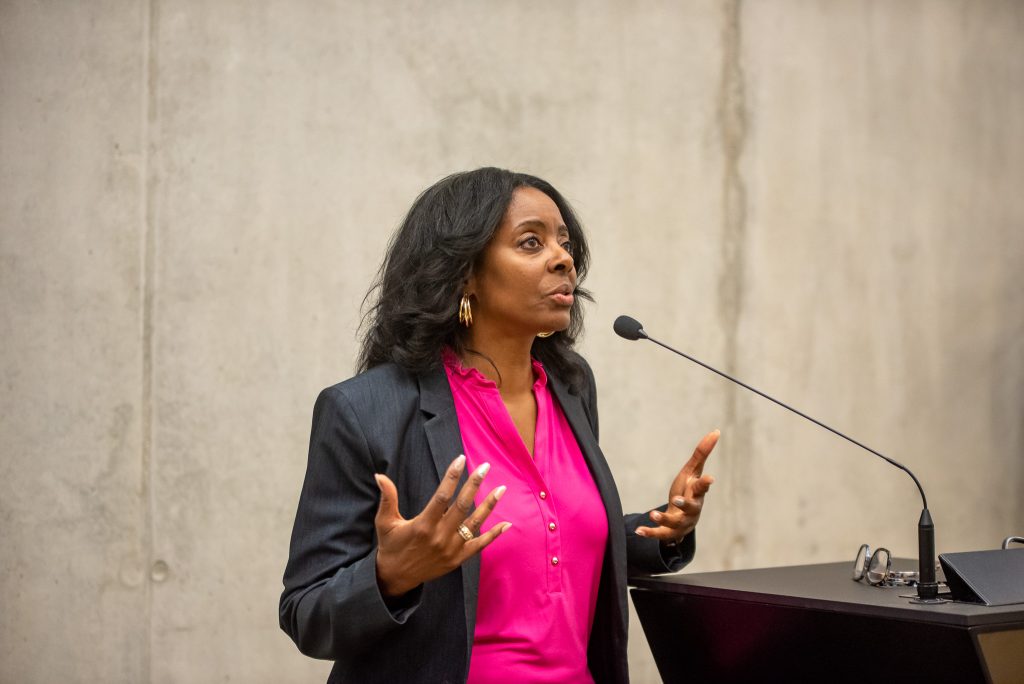
Journalists must find atypical stories
The Howard University associate professor argues that journalists need to do more than just answer the 5 “W” (who, what, where, when, why) but also to find the truly atypical, human stories. For instance, she covered the one-year anniversary of Oklahoma City bombings and interviewed a firefighter who participated in the rescue efforts as a first responder, as well as a grandmother who lost her grandchildren. Another one of such human stories earned her some awards.
“When I was in local news, an older black woman called a TV station. [She] talked about an area in North Carolina near an army base and how her families from slavery were buried on this land and they were trying to put a business on this property. It affected me so much, I [spent] several months researching the story, then [we] went there to cover it. [She] showed us this land where her family is buried, where a private businessman was bulldozing and putting down cement to put a parking lot for business. And through our story we were able to stop those efforts”, Jennifer Thomas recalled, noting that this is one of her most impactful stories.
In response to the question about the increasing role played by artificial intelligence, the journalism expert stated that AI can be useful in areas such as medicine or other sciences, e.g. in cancer treatment or as a much more effective way to detect tumours early. However, in journalism, AI cannot replace people.
“You cannot eliminate that human element. It’s like watching the movie where a computer becomes a person. You can’t teach human empathy. You can’t necessarily put story into context by just giving the answer to the question. I think that’s how AI is not beneficial to journalists”, she observed.
Jennifer Thomas held a lecture at VMU titled ‘When Facts Are Not Enough: How To Sustain Journalism In An Era of Disinformation’. She also participated in the international academic Romas Sakadolskis Journalism Forum, which is organised annually by Vytautas Magnus University and Vilnius University. The visit/lecture were organised in cooperation with the U.S. Embassy in Lithuania.
About Jennifer Thomas
Jennifer C. Thomas is an Associate Professor and leads the Journalism Sequence in the department of Media, Journalism and Film at Howard University. Named the Scripps Howard Foundation 2019 Teacher of the Year, she uses multiple instructional methods and is dedicated to ensuring her students have a successful transition from classroom to newsroom. Her current and former students include Emmy, Hearst, and National Association of Black Journalists award winners.
Jennifer Thomas is also founder of MediaReadyConsulting LLC, which provides coaching, consulting, and Media Relations services. Thomas believes that journalists are the defenders of democracy, freedom fighters of the First Amendment, and savvy and sophisticated storytellers. A published author, her research interests include the dissection of current practices and pedagogies in journalism, the transition from professional to professor, and the complex facets of women, media, and images.
She has presented research in Namibia, Africa; Lagos, Nigeria, where she was the special lecturer, trainer, and keynote speaker for the country’s observation of World Press Freedom Week; and throughout South Africa, as the featured guest during its Media Freedom Week. In 2020, Thomas was named as one of six 2020 U.S. Howard University Fulbright awardees. During her Fulbright program, she plans to focus on media and journalistic freedom with regards to the phenomenon of “fake news,” under the larger umbrella of ethics and dignity in reporting.

